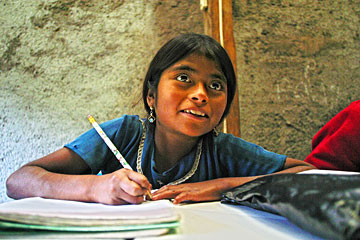Mission Mexico counters violence of poverty with hope
COFFEE WITH WARREN, with Warren Harbeck
Cochrane Eagle, February 8, 2012

The violence of poverty and lack of educational opportunities among Mexico’s mountain communities is being countered by Mission Mexico, a southern Alberta Catholic outreach that had its start in Cochrane.
Photo by Rodrigo Cruz
“Violence in Mexico!” scream the media, headlining the deadly drug wars and assaults on visitors in the popular tourist destination.
But there’s another kind of violence that I want to highlight this week, and one solution to this kind of violence has a significant Cochrane connection.
I’m referring to the marginalized mountain people of southern Mexico, violated by history, poverty, inadequate education and denial of human rights.
Twelve years ago, Fred Monk, then-pastor of St. Mary’s Catholic Church in Cochrane, visited many of these struggling communities in the state of Guerrero.
Deeply moved by what he experienced, he returned to Cochrane to establish Mission Mexico as a humanitarian outreach to the poorest of the poor.
Mission Mexico’s initiatives in health, education, nutrition and human rights have become rays of hope for many of the forgotten people in the region known in Spanish as La Montaña, “the mountains.”
This local outreach quickly caught the imagination of other Catholic parishes and schools throughout southern Alberta.
It also caught the imagination of an internationally acclaimed Mexican human rights advocate who has been profuse in his praise for Cochrane’s lead in responding to the needs of the more than 400,000 indigenous people of his region.
Abel Barrera is the founder and director of the Tlachinollan Human Rights Center of the Montaña and the recipient of the 2010 Robert F. Kennedy Human Rights Award.
Alluding to the outrageous living conditions of these communities “buried in oblivion and poverty,” Barrera said:
“Father Fred has heard and listened . . . . The pain of the women and children has forever marked his life as a priest. Ever since he came to know La Montaña . . . he understood that he had a very important mission to carry out.”
The value of reciprocity has long characterized the indigenous cultures of the region, a value rooted in the importance of finding “the most sublime meaning of life in offering things with all your heart,” Barrera noted.
“Mission Mexico was born from these charitable roots which give life and meaning to the people of La Montaña,” he said, referring to Father Fred’s sensitivity to this important value and to his vision for the cause of justice among these poorest of the poor in this forgotten region.
“It is one more seed that has been sown in the field of the community, seed that inspires hope that there might be health, education, food, water, work and fiesta.”
In sowing these seeds of hope, Mission Mexico has worked in partnership with other, on-site, charitable agencies and indigenous leaders to build a school, offer adult literacy and nutrition programs, establish clinics, underwrite clean-water and sanitation projects, and provide scholarships, among other activities, all respectful of traditional cultures and languages.
For several years now, I’ve had the privilege of being a member of Mission Mexico’s advisory board. I’ve had the opportunity not only to read the encouraging remarks of people like Abel Barrera, but also to review Rodrigo Cruz’s award-winning human rights photography of La Montaña and Mission Mexico’s projects there.
Then, of course, I am continually moved by the thank-you notes from beneficiaries of Mission Mexico’s projects, such as this note from one scholarship recipient:
It “gives me great joy to know that there are people like you who are generously willing to help me and others. . . . I know that God exists because I know that people like you exist. Thank you for everything.”
The violence of poverty – countered with hope!
© 2012 Warren Harbeck
JoinMe@coffeewithwarren.com